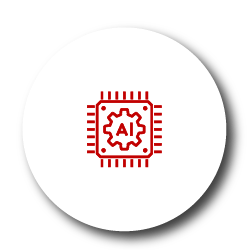Consumers are reshaping the market with their ever-changing preferences and buying behaviours, highlighting the need for a technological overhaul in the retail industry, points out McKinsey. Meanwhile, AI has become a differentiating factor between non-adopters and retailers who are rapidly gaining market share with AI-based retail analytics gaining importance during the COVID-19 pandemic.
Automation through AI can be implemented across your business in various functions such as category strategy, merchandising, assortment planning, clustering and more. That means that today, AI or artificial intelligence can have a major impact on how you approach your category management efforts. But how much of an impact can it truly have? And how is DotActiv looking to approach it?
About the contributors
Erin Hodgson joined DotActiv in 2019 as a senior space planner with an honours degree in Consumer Science and is currently completing her Master’s Degree. Since then she has worked predominantly on the Makro and Dischem accounts as the cluster development manager and is the newest addition to the operations team. She is also a member of DotActiv’s cross-functional management forum.
Chris Muller joined DotActiv in 2012 as a developer with a BSC Honours Degree in Business Computing and Information Systems. Since then, he works predominantly on the C++ DotActiv application and database SQL scripts and innovation projects as a senior developer. He is also a member of DotActiv’s cross-functional management forum.
Chris Hawkridge joined DotActiv in 2017 as a C++ developer and is currently completing his Computer Science degree. Since then, he works predominantly on innovation projects for the DotActiv applications.

What is Artificial Intelligence?
Artificial intelligence and machine learning are some of the hot topic buzzwords of the last five years, especially in industries that are newly adopting these technologies. In an article for Forbes, Bernard Marr notes that these terms are often used interchangeably. However, they are not quite the same thing.
He continues to point out that AI is the overarching concept that machines can replicate the human decision-making process and human behaviour. Machine learning, meanwhile, is an application of artificial intelligence based on the fact that machines are provided with data and should learn for themselves.
In simple terms, artificial intelligence is a machine that can make decisions on its own based on what it has learnt from data you have provided. This is achieved through the programming of complex algorithms.
This technical discipline uses various techniques to develop systems that simulate human intelligence. The system can learn, and solve problems just as a human would. The goal is to develop a smart machine capable of performing different tasks that would otherwise require human labour and intelligence. Overall, artificial intelligence is a branch of computer science that aims to enhance software with the ability to analyse its environment using either predetermined rules and algorithms, or pattern recognising machine learning models, and then make decisions based on those analyses.
AI has been used successfully in other industries and is making its way into the retail market via industry disruptors and early adopters. Some examples of these include fraud prevention in the banking industry by analysing transactions, predictive analysis of market trends in financial trading, and chatbots used on websites by various sectors.
Besides the above examples, software engineer, serial entrepreneur and former contributor to Forbes, Robert Adams, points out a few companies in his piece. These include Alexa, Tesla and Netflix or name a few of the most well-recognised businesses.

Are there use cases for AI in retail?
The use of AI in the retail industry has been growing significantly over the past few years. According to a study conducted by the IBM Institute for Business Value published in 2018, the adoption of AI-based automation within the retail sector will reach at least 80% for certain countries by 2021.
 Projected impact of automation by core merchandising activity courtesy of McKinsey & Company.
Projected impact of automation by core merchandising activity courtesy of McKinsey & Company.
The demand for this technology is driven by industry role player’s need for improved productivity, enhanced analytics, operational processes and customer experience. Some of the following examples are use cases for AI in retail.
Product categorisation
Supervised machine learning and AI can classify products into different categories based on a set of training data (historical sales data). You can use this application within a recommendation engine on your online store. This will provide customers relevant products when they search for certain items or terms.
Product classification for internal use by retailers and third party category management experts like DotActiv is also beneficial. This is utilised by processing and leveraging the data for a profitable outcome through category management practices and strategies.
Implementing a system like this would involve obtaining a training data set, training and validating models, implementing the models in some kind of prediction service. An example of this is a RESTful Web Services.
Consumer intent and behaviour
Another example of the use of AI in retail relates to in-store heatmapping. You could use a combination of cameras and computer vision to gather data on customer product interaction and customer movement in-store. This would recognise customer intent and behaviours to optimise the customer experience accordingly.
The intelligence gained can be used to create experiences that promote engagement with products. By combining this intelligence with transaction data, you can acquire insights into sales performance during high and low traffic for each store. Implementing such a system would involve deep learning for image recognition and recognising customer intent.

How does DotActiv implement AI in category management?
DotActiv recognises the importance of continuous improvement and the cutting edge nature of AI technologies. New innovations incorporating this approach have been laid out in our strategic roadmap for the next five years. While we cannot reveal everything, below are two examples of what to expect.
Product Classification Tool
Currently, product classifications are completed manually on the retailer’s database one product line at a time, but with automated product classification tool, all new listings will be classified together in record time.
DotActiv is developing a product classification tool using machine learning that will allow our users to have correctly classified data without manual labour hours generally involved in this task. This innovation will speed up service delivery for our clients as well.
Cluster Optimiser Tool
DotActiv has also built the cluster optimiser, which helps you cluster your stores based on their similarities. Clustering is an unsupervised machine learning approach that uses algorithms to determine relationships between stores using the user’s specified criteria.
You can read more about our Cluster Optimization service, which uses this specific tool to develop and recommend category-based clusters. The goal here is to uncover clustering opportunities, which translate to a shopper-centred approach to assortment and space optimisation.
Conclusion
Across the world, new technologies are changing the way we run businesses and how consumers shop. Therefore, integrating these methods into your business are a way to stay relevant and profitable.
When you evaluate the various applications of artificial intelligence, it is not always easy to choose which solutions would be the most feasible and effective for your business. Need assistance with clustering? Let DotActiv help. Find out more about our cluster optimization service or book a complimentary meeting with a DotActiv expert.


